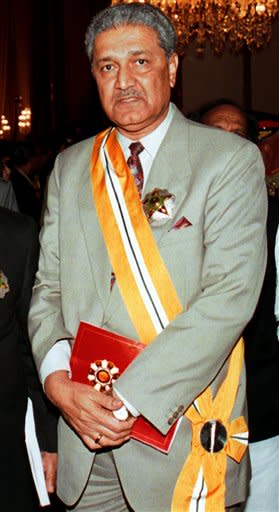 The Envoy
The EnvoyAQ Khan: North Korea bribed Pakistani generals for nuclear technology

The father of Pakistan's nuclear program, Abdul Qadeer Khan, has long asserted that he conducted all his nuclear bomb-making and proliferation activities with a full complement of blessings, winks and nods of the Pakistani state. Naturally, Pakistan has denied all of Khan's claims--but also freed Khan from house arrest and refused to give U.S. officials access to question him.
Today, the Washington Post reported on documentation released by Khan purporting to show that North Korean officials bribed senior Pakistani military officials to help obtain and transport nuclear enrichment technology in the late 1990s.
The Post has tried to authenticate one 1998 letter that is allegedly from a top North Korean official to Khan, describing the terms of the supposed transaction. U.S. officials told the Post's Jeffrey Smith they believe the document and signature to be authentic and describe transactions they believed had occurred, while also saying they couldn't be absolutely confident of the document's veracity.
Meanwhile--and again, unsurprisingly--the two retired generals described as receiving bribes in the letter vigorously deny the claims and denounce the letter as a fabrication. (Adding to the awkwardness, one of them, former Pakistani Army Chief of Staff Gen. Jehangir Karamat, served as Pakistan's ambassador to Washington from 2004-2006.)
"The major takeaway from the story here is the extent that corruption in Pakistan—which we already know exists—may have crossed over into facilitating proliferation," Paul Brannan, a nuclear expert with the Institute for Science and International Security, told The Envoy.
From R. Jeffrey Smith's investigation in the Post:
U.S. officials have worried for decades about the potential involvement of elements of Pakistan's military in illicit nuclear proliferation, partly because terrorist groups in the region and governments of other countries are eager to acquire an atomic bomb or the capacity to build one. [...]
A previously undisclosed U.S. investigation of the corruption at the heart of the allegations — conducted before the letter became available — ended inconclusively six years ago, in part because the Pakistani government has barred official Western contact with Khan, U.S. officials said.
By all accounts, Pakistan's confirmed shipments of centrifuges and sophisticated drawings helped North Korea develop the capacity to undertake a uranium-based route to making the bomb, in addition to its existing plutonium weapons. Late last year, North Korea let a group of U.S. experts see a uranium-enrichment facility and said it was operational. ...
One unnamed expert on the Pakistani-North Korean relationship, who shared, on condition of anonymity, an analysis of the Post piece with Jeffrey Lewis at the ArmsControlWonk blog, argued that if the missive proves to be on the level, its major revelation is that North Korea was pursuing a secret uranium enrichment program in the very period it had agreed to freeze its plutonium program:
The bigger picture is straightforward and eerily fascinating. Here, in the midst of the Agreed Framework period, when North Korea's plutonium program was frozen, we get almost a firsthand glimpse of Jon Byong-ho, Kim Jong-il's champion arms salesman and nukes acquisition specialist, going behind America's and South Korea's backs to acquire a different fissile material production technology, one they had forsworn in the Joint Denuclearization Declaration of 1992. And there is A.Q. Khan organizing the payment of bribes to Gen. Jehangir Karamat and Lt. Gen. Zulfiqar Khan (not to be confused with the late Air Chief Marshal Zulfiqar Ali Khan) so he could swap gas centrifuge technology for missile production technology.
Within no more than a year or so of this letter, Khan was already trying to sell missiles to a third country. And within a couple of years, he was organizing the shipment of North Korean uranium hexafluoride to his customers in Libya. It was a fruitful relationship for both sides.
